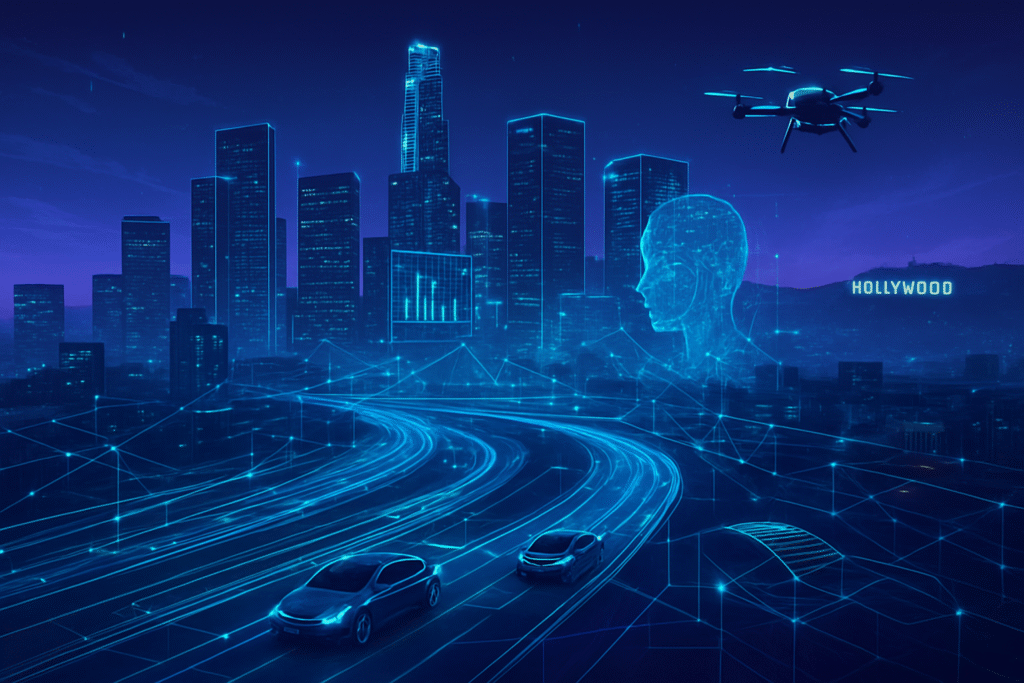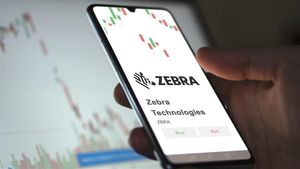
As the world's gaze turns towards Los Angeles in anticipation of a series of monumental sporting events—including the 2026 FIFA World Cup, the 2027 Super Bowl, and the 2028 Olympic and Paralympic Games—the city is not merely preparing to host; it is undergoing a profound technological metamorphosis. At the heart of this transformation is an ambitious integration of artificial intelligence (AI) across its urban fabric, aimed at revolutionizing everything from traffic flow and public safety to the overall visitor experience. This strategic deployment of AI, encapsulated in the "Smart City LA 2028" initiative, signifies a pivotal moment in urban development, positioning Los Angeles as a vanguard in leveraging intelligent systems for large-scale event management and sustainable metropolitan growth.
The immediate significance of this AI-driven overhaul extends beyond mere logistical improvements. It represents a commitment to reimagining the urban environment itself, moving from a traditional "car city" to a multimodal transit hub powered by data and predictive analytics. By embedding AI into critical infrastructure and public services, Los Angeles seeks to not only ensure the seamless execution of these global events but also to establish a lasting legacy of efficiency, connectivity, and enhanced quality of life for its residents and future visitors. This proactive embrace of AI signals a new era for smart cities, where technology serves as the backbone for unprecedented levels of urban intelligence and responsiveness.
The Digital Backbone: AI's Technical Blueprint for a Smarter LA
Los Angeles's AI strategy is underpinned by a sophisticated array of technical advancements designed to address the complex challenges of hosting millions of attendees. A cornerstone of this approach is the evolution of traffic management. The city is upgrading its Automated Traffic Surveillance and Control (ATSAC) system, which already boasts 45,000 loop detectors and over 4,850 connected intersections. AI-powered algorithms analyze real-time data from these sensors and cameras to dynamically adjust traffic signals, predict congestion hotspots, and optimize flow. This differs significantly from previous static or reactive systems by offering predictive capabilities and adaptive responses, aiming to drastically reduce commute times and manage event-day surges more effectively.
In the realm of public safety, AI is being deployed for predictive policing and crowd management. Computer vision systems are being integrated to monitor large gatherings, detecting unusual behaviors, unattended objects, or potential bottlenecks in real-time. AI models can simulate various crowd scenarios, factoring in variables like weather and expected attendance, to help planners design optimal entry/exit points and space utilization. This proactive approach to security and crowd control represents a significant leap from traditional human-centric surveillance, offering instant alerts and data-driven insights for emergency responders. Furthermore, the Los Angeles Police Department (LAPD) is utilizing virtual reality (VR) for officer training, allowing for immersive practice in de-escalation techniques and appropriate use-of-force scenarios, mitigating risks associated with real-life drills.
Infrastructure upgrades are also heavily reliant on AI and related technologies. The Los Angeles International Airport (LAX) is undergoing a multi-billion dollar transformation, including an automated "people mover" system capable of handling 85 million passengers annually with two-minute peak-hour intervals, leveraging full automation and electric technology. The "Smart City LA 2028" plan also includes incentives for widespread fiber-optic buildout and a target of 10,000 public electric vehicle charging stations by 2024. These initiatives, while not solely AI-driven, create the essential data infrastructure and sustainable environment for AI systems to thrive, enabling everything from smart parking solutions to optimized energy grids. The initial reactions from urban planning and tech communities highlight the ambitious scale and integrated nature of LA's strategy, often pointing to it as a potential blueprint for other global cities facing similar challenges.
Corporate Beneficiaries and Competitive Edge in the AI Arena
The extensive AI integration in Los Angeles creates significant opportunities and competitive dynamics for a range of technology companies, from established giants to innovative startups. Google (NASDAQ: GOOGL) stands out as a primary beneficiary and key partner. The City of Los Angeles is collaborating with Google Public Sector to deploy Google Workspace with Gemini across its 27,500 employees, enhancing internal communication, automating administrative tasks, and streamlining project management. This partnership also leverages NotebookLM for reviewing large documents and identifying funding opportunities. As a founding partner for the LA28 Olympic and Paralympic Games, Google's Gemini and Google Cloud are poised to play a crucial role in data management, service personalization, and real-time communication for the event, significantly boosting its market position in government and large-scale event solutions.
Beyond Google, companies specializing in smart city infrastructure, IoT devices, and cybersecurity are set to gain. Firms developing advanced sensor technologies, computer vision analytics platforms, and predictive modeling software will find a robust market in LA's ongoing development. The city's collaboration with the University of Southern California (USC) and various tech companies to form I3, a consortium focused on developing a city-wide Internet of Things (IoT) environment, signals a fertile ground for startups and established players in this domain. This initiative aims to connect everything from traffic lights and parking meters to smartphones, creating a truly responsive urban ecosystem.
The competitive implications for major AI labs and tech companies are substantial. Success in Los Angeles could serve as a powerful case study, influencing other global cities preparing for major events or simply seeking to modernize their infrastructure. Companies that can demonstrate robust, scalable, and ethically sound AI solutions in a high-stakes environment like the Olympics will gain a significant strategic advantage. This development could also disrupt existing service models, pushing traditional urban planning and public safety contractors to adopt more AI-centric approaches or risk being outpaced by more technologically agile competitors. The focus on cybersecurity, given the increased digitization, also creates a burgeoning market for AI-powered threat detection and prevention solutions, positioning specialized cybersecurity firms for growth.
The Broader AI Landscape: Vision, Concerns, and Milestones
Los Angeles's ambitious AI strategy for its upcoming mega-events is more than just a local initiative; it's a significant marker in the broader AI landscape, illustrating the accelerating trend of "smart city" development globally. This integration of AI into urban planning, public safety, and citizen services highlights a shift from theoretical discussions about AI's potential to concrete, large-scale deployments that directly impact daily life. It fits into a wider movement where cities are increasingly viewing AI as a critical tool for improving efficiency, sustainability, and resilience in the face of growing populations and complex urban challenges. The sheer scale of data collection and analysis required for such an endeavor pushes the boundaries of current AI capabilities, particularly in areas like real-time predictive analytics and multimodal data fusion.
However, this widespread deployment of AI also brings forth significant ethical concerns, primarily regarding privacy and potential bias. The use of AI-driven surveillance systems, while enhancing public safety, raises questions about the collection and use of biometric data, the potential for false positives, and algorithmic discrimination. California, with its strong constitutional right to privacy and the California Consumer Privacy Act (CCPA), is actively grappling with these issues, with legislators considering bills to ban discrimination by AI tools. These concerns underscore the critical need for transparent AI governance, robust data protection measures, and ongoing public discourse to ensure that technological advancements serve the public good without infringing on civil liberties.
Comparing this to previous AI milestones, LA's project represents a move beyond isolated AI applications (like self-driving cars or voice assistants) towards a holistic, interconnected urban intelligence system. While not a singular "breakthrough" in the mold of AlphaGo's victory over Go champions, it signifies a crucial breakthrough in the practical, large-scale integration of diverse AI technologies into complex real-world environments. It demonstrates the maturation of AI from specialized tasks to an enabling technology for comprehensive urban transformation, potentially setting a new standard for how cities worldwide approach modernization and event management.
The Horizon: Future Developments and Emerging Challenges
Looking ahead, the AI initiatives in Los Angeles are poised for continuous evolution, with both near-term and long-term developments on the horizon. In the immediate future, we can expect further expansion of 5G connectivity across the city, providing the necessary high-speed infrastructure for more advanced AI applications, particularly those involving real-time data processing and edge computing. The rollout of personalized AI-powered travel itineraries and mobile applications will likely intensify, offering more sophisticated recommendations and seamless navigation for visitors. Interactive chatbots are also expected to become more prevalent, providing instant, multilingual assistance for event attendees and residents alike.
Longer term, experts predict that Los Angeles will continue to refine its AI models, moving towards even more predictive and autonomous urban management systems. This could include highly adaptive infrastructure that anticipates needs before they arise, such as self-optimizing energy grids or waste management systems that respond dynamically to urban activity. The modernization of the city's 311 system with AI tools is designed to be a lasting piece of infrastructure, ensuring that improved service delivery extends far beyond the major events. Potential applications on the horizon include advanced environmental monitoring using AI to combat pollution, and AI-driven solutions for affordable housing and resource allocation, making the city more equitable.
However, several challenges need to be addressed. The ongoing ethical debate surrounding AI surveillance and data privacy will require continuous legislative and technological safeguards. Ensuring the cybersecurity of interconnected urban systems will be paramount, as the increased reliance on digital infrastructure presents new vulnerabilities to cyberattacks. Furthermore, the challenge of integrating disparate AI systems from various vendors into a cohesive, interoperable framework will test the city's technical prowess and its ability to foster collaborative ecosystems. Experts predict a future where AI becomes an invisible layer of urban intelligence, seamlessly enhancing city functions, but only if these complex technical, ethical, and integration hurdles can be successfully navigated.
A New Blueprint for Urban Intelligence: Wrapping Up LA's AI Journey
Los Angeles's strategic embrace of artificial intelligence for its upcoming global sporting events marks a pivotal moment in the evolution of smart cities. The key takeaways from this ambitious undertaking are clear: AI is no longer a futuristic concept but a practical, indispensable tool for urban planning, public safety, and enhancing the citizen and visitor experience. By leveraging AI-powered traffic management, predictive security systems, and personalized digital services, Los Angeles is striving to become a connected, efficient, and intelligently responsive urban center. This development signifies a profound shift in how cities prepare for and manage large-scale events, setting a new global benchmark.
The significance of this development in AI history lies in its demonstration of large-scale, integrated AI application in a complex, high-stakes environment. It moves beyond isolated AI successes to showcase the technology's capability to orchestrate an entire urban ecosystem. While the benefits of enhanced efficiency and safety are evident, the ongoing discussions around data privacy, algorithmic bias, and cybersecurity underscore the critical importance of responsible AI development and deployment. The city's efforts will serve as a living laboratory, providing invaluable lessons for other metropolitan areas around the world.
In the coming weeks and months, the world will be watching Los Angeles closely. We should look for concrete results from the initial deployments, particularly in traffic flow improvements and public safety metrics. The ongoing dialogue between policymakers, technologists, and privacy advocates regarding AI governance will also be crucial. Ultimately, LA's journey is not just about hosting a few events; it's about forging a lasting legacy of urban intelligence, providing a compelling vision for how AI can fundamentally reshape our cities for the better, making them more resilient, responsive, and ready for the future.
This content is intended for informational purposes only and represents analysis of current AI developments.
TokenRing AI delivers enterprise-grade solutions for multi-agent AI workflow orchestration, AI-powered development tools, and seamless remote collaboration platforms.
For more information, visit https://www.tokenring.ai/.






